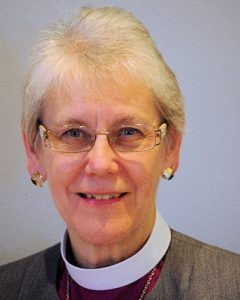
Writing only days after the conclusion of the Assembly and General Synod 2023 held in Calgary, let me reflect on some aspects of this synod for our Anglican family.
There were wonderful moments of affirmation of relationships old and new. Our relationship with the Evangelical Lutheran Church in Canada (ELCIC) is maturing: we made commitments to work together and not duplicate committees and task groups so that we will learn from the wisdom and skills each has to offer. While there are stumbling blocks that we do still encounter, such as our different understandings of the diaconate and confirmation, we are committed to continuing our journey together. I look forward to the joint staff meetings where we’ll be putting this into practice.
We celebrated Churches Beyond Borders—the four-way full-communion partnership that exists between the Anglican Church of Canada, ELCIC and their counterparts in the United States, The Episcopal Church and the Evangelical Lutheran Church in America—and added the Moravian Church in Canada as a full communion partner, opening possible avenues for other sharing. The barriers between denominations are being dismantled to allow the flourishing of God’s work and the gifts of God’s children to be shared.
We approved a wide range of new liturgical resources for use as needed in the church. We continue to treasure the rich tradition of common prayer while recognizing new opportunities for formation in prayer or the marking of particular pastoral moments.
In 2019 General Synod requested that our structures for governance be reviewed though the issues being addressed were not all immediately clear. The governance working group wrestled with a variety of possible changes and offered several to General Synod for discernment. Although some people express frustration with the parliamentary processes of our governance structure, they do offer the opportunity to hear the views of a wide variety of synod members. For some the entire structure is far removed from their parish and community life and hard to assess. For others the proposals sought to move too quickly to permit change. For others, the role of the bishops was either overemphasized by disproportional authority to deny change or underemphasized in light of episcopal calling, training and vocation. The debates led to postponement or denial of changes but did highlight the diversity of understanding of our synodical structures and the breadth of our theological understanding of the role of bishops. These will not be resolved easily or quickly and will be the subject of much conversation, I am sure!
We were clear in our call for peace in Sudan and raised $4,800 in one day to be matched 4:1 by federal government funding. However, we struggled to balance the voices of different communities in Israel and Palestine in our statement on that conflict. A Jewish rabba invited us to better understand the relationship of Judaism to the land of Israel while others wanted the statement to wait for further consultation and others felt that we cannot wait in the light of the increasing and disproportionate violence against Palestinians. These seemed to be mutually exclusive! We did find a way, however, to acknowledge the disparate voices by removing a clause we agreed needs further consultation. And we committed to that consultation while offering the voice of our church, in concert with that of the ELCIC, on the needs that our Palestinian partners had identified as urgent. Although this kind of process can seem difficult in the heat of the moment, it’s Anglican discernment working as it should.
We now have our strategic commitments confirmed, and the work to shape our church to better reflect our values begins. Thank you for your prayers. Now pray for all those elected and chosen to carry out the work!





